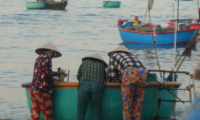New report shows how national human rights institutions can use their mandates within fisheries

On the 2nd and 3rd of November, leading experts, including small-scale fishers, indigenous communities, UN institutions, representatives of the fishing industry, and national human rights Institutions, convene in Copenhagen to address the complex interplay between human rights and fisheries.
To inspire greater engagement by national human rights institutions on human rights and fisheries, the Danish Institute for Human Rights is launching a briefing note for National Human Rights Institutions on how they can apply their mandates in this regard.
Fisheries and aquaculture are central to the livelihoods of almost 600 million people across the globe. It provides food and nutrition to billions of people. More than 120 million people are employed in capture fisheries’ value chains or engage in subsistence farming. For indigenous peoples, fishing activities are integral to their way of life and culture.
Yet, across the world, small-scale fishers, fish workers and their communities face a wide range of threats to their lives and livelihoods. Many of these threats constitute abuses and violations of their human rights.
National human rights institutions have a mandate and a potentially important role to play in promoting and protecting human rights. However, the examples of national human rights institutions using their role for promoting and protecting human rights within the fisheries and aquaculture sectors are still relatively few. Likewise, the collaboration between human rights actors and organisations working to improve the livelihoods of small-scale fishers, fish workers and their communities remains limited. The dialogue with indigenous peoples for whom fishing is a traditional practice is also sparse.
The briefing note aims to provide an overview of key human rights issues in the sector and enhance the engagement of national human rights institutions in the promotion and protection of the human rights of fishers, fish workers, and fishing-dependent communities.
Several human rights in play
Many small-scale fishing communities experience high levels of poverty and face considerable threats to their right to an adequate standard of living, particularly their right to food. For instance, a study on small-scale fishing communities in Ghana showed that declines in fisheries had resulted in incomes insufficient to cover basic needs, affecting the availability of food in the communities.
People working in the fishing industry often face precarious types of employment and are exposed to egregious forms of labour exploitation, including trafficking and forced labour. Workers are also frequently victims of discrimination based on socio-economic status, ethnic origin, migrant status, and gender and age, among others.
There are several ways for national human rights institutions to promote and protect human rights in the fisheries and aquaculture sectors. The briefing note provides examples of how some national human rights institutions have applied their mandate in this regard and calls for the more proactive involvement of human rights actors in this area.
